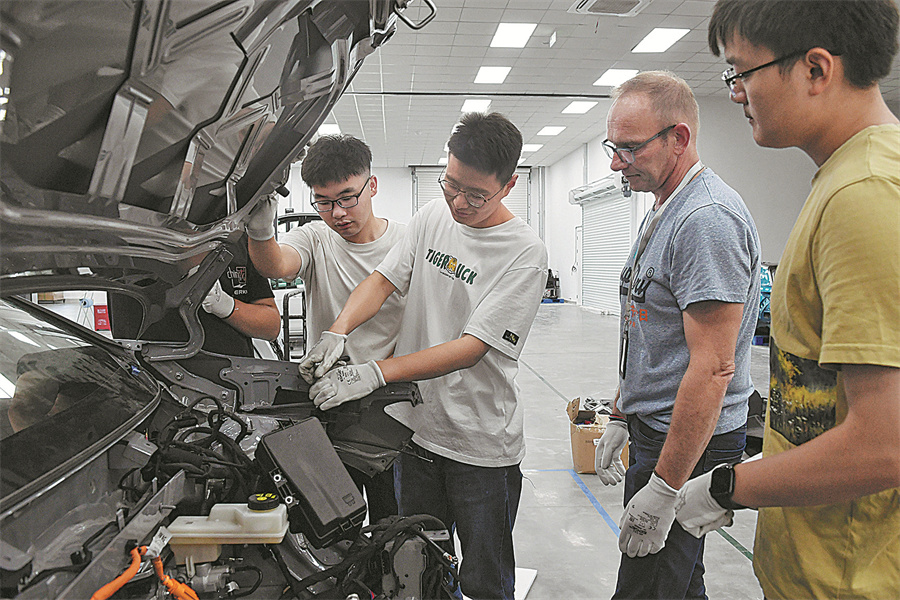Graduates conquer series of tough challenges

Huang Xinran, a law graduate from Chongqing University, has found work as an illustrator. [HUANG WEI/XINHUA]
Members of post-2000 generation map out career paths despite difficulties posed by COVID-19
The first group of university graduates from the post-2000 generation are determinedly mapping out their futures as they benefit from a stable economy.
For 22-year-old Chen Ze, who graduated from Shanghai Jiao Tong University this summer after studying industrial design, "growing up "are the keywords that sum up his four years at the institution, where he will begin postgraduate studies after the summer vacation.
"The post-2000 generation is no longer a symbol of immature young people, but of adults entering society while facing pressure to continue studying, look for jobs, settle down in big cities, and even get married," Chen said.
Four years ago, he decided to study industrial design for his major, as it is related to science and engineering, subjects that he is interested in. However, Chen started his first year by enrolling in courses in design, which he had never studied before.
"Learning from my failures has had the most impact on me at university. I had the courage to try harder and learn from others' strengths to enhance my own weaknesses," Chen said.
While he was in the second year, he opted to continue later with postgraduate studies. He worked extremely hard, sometimes studying throughout the night to gain high marks. He also took part in a variety of activities, such as being a volunteer for the 2021 China International Import Expo in order to qualify for a postgraduate recommendation.
"Many of my classmates chose to look for jobs, but they found it extremely difficult to land work. I don't think I am ready to face such fierce competition yet, as I haven't acquired enough knowledge, experience and ability to reach my goal of changing people's lives with my expertise," Chen said.
Choosing design for his major after winning prizes in design competitions over the past four years, Chen added that he aims to use his professional skills to design innovative products by combining technology and art.
This year's graduates experienced a hard time, as they had to take online courses due to the COVID-19 pandemic. In Shanghai, Chen found life particularly difficult.
Due to outbreaks of the disease in the city, university students were confined to their campuses for two months, while local residents were not allowed to leave their neighborhoods.
Chen said, "On the positive side, I managed to arrange my study time properly and get everything well organized by taking online courses, but I regret there was no graduation ceremony at the university for millennials." He said this meant that he did not have the chance to say a "proper goodbye" to his undergraduate studies.
According to the Ministry of Education, the number of college graduates in China this year reached 10.76 million, surpassing 10 million for the first time. As of mid-April, only 23.61 percent of graduates had either found jobs, or were continuing their studies.
In addition to the impact of COVID-19, college students this year are facing some of the toughest challenges ever to find work.
Hu Jiahui, human resources manager at a cultural company in Shanghai, said: "There are not as many vacancies available in the market for fresh graduates as in previous years. However, the number of applicants continues to grow, which has forced us to raise our recruitment standards, such as requiring higher qualifications and more work experience."
Unlike previous generations, applicants from the post-2000 generation are more confident and clearer about the goals they want to achieve, and also prefer to stick with their own thoughts instead of listening to others, Hu added.
According to the latest report from 51job Inc, one of the biggest human resource service companies in China, 45.2 percent of graduates are planning to work after they complete their studies, down by 7.1 percent year-on-year, while 28.2 percent have decided to further their studies, a 2.6 percent year-on-year rise.
Like Chen, the student in Shanghai, Wang Yulu, 21, who graduated from Zhejiang Vocational Academy of Art, where she studied music performance, has also decided to further her studies, as her college degree is not sufficient for her to become a teacher.
"I started thinking about applying for university in my first year at college, because if I want to find a promising job, then a bachelor's degree is essential, while a master's would be even better," said Wang, who started learning the guzheng, or Chinese zither, when she was 9 and chose it for her major at college.
In May, Wang received an offer to study music education at Wenzhou University in Zhejiang province, where she plans to apply for a postgraduate course.
"My three years at college taught me that I should keep fighting against pressure and failure, and that I should be strong-minded to face fierce competition. On the other hand, I was motivated to improve and learn step by step," said Wang, who believes that the word "fearless "epitomizes the post-2000 generation.

Luosang Yisi, 21, runs a restaurant in his hometown in Maizhokunggar county, Lhasa, Tibet autonomous region. [JIANG FAN/XINHUA]
Business failure
To avoid the intense competition to find work, some new graduates are planning to return to their hometowns instead of moving to big cities such as Beijing and Shanghai.
Si Yue, from Longyan, Fujian province, decided to return home to find a job after failing to launch her own film and television studio due to a lack of money.
"In the third year at university, I began making detailed plans to launch my own business. However, this was far more complicated than I expected, so eventually my dream ended with the collapse of my cash flow," said Si, who graduated from Jiangxi University of Technology in Nanchang after majoring in broadcasting and television directing.
Looking back on her four years at university, she said that filming a documentary with her team made the most impact on her. The project required the team members to get up at 2 am, after which they shivered on a street for three hours just to complete a single shot that lasted a few seconds.
"Over the years, I have learned to become dedicated, which has encouraged me to follow my passion for the film and TV industry through persistence and hard work. Dedication has also brought me back from rock bottom on a number of occasions," Si said.
She has been relatively fortunate compared with many other graduates who are still applying for jobs, for which they attend interviews, but fail to be offered employment. Si quickly recovered from her business setback, passing a job interview soon after applying for her first position.
Now working as a TV and film copywriter for a short-video company in Longyan, Si said, "Many graduates are struggling to achieve their dreams in big cities such as Beijing, Shanghai and Guangzhou. My plan to return home didn't seem to be a good one initially, but I didn't have a better option."
Members of the post-2000 generation, born in the third decade of China's reform and opening-up-a prime time for the nation's economic growth-are considered to lead a more affluent and carefree lifestyle than previous generations.
Si said members of the post-2000 generation stand out for being personable and determined, despite being stereotyped as not having experienced suffering or hardship, lacking the ability to be grateful, and being too stubborn to listen to suggestions from others.
"I think members of my generation are like a star with sharp edges and corners, so we dare say 'no' to injustice, and express our points of view in public, but we also have a more tolerant way of looking at things," Si said.
The motto "never give up, just be yourself" is one that Si wants to share with future graduates. "As long as you do not give up, no one can give up on you, and the world will sooner or later belong to the post-2000 generation," she said.
Yu Hai, a sociology professor at Fudan University in Shanghai, said: "Graduates from this generation are facing challenges, so they shouldn't be viewed as not having experienced hard times. They will continue to face difficulties, but I believe they will make their own way because they are optimistic, determined and refuse to concede defeat."
Lowest point
For 22-year-old Lu Yue, who has just graduated from Shanghai Normal University after studying advertising, this year has been one of fluctuating fortunes.
She thought she had hit the lowest point of her life when she failed the postgraduate entrance exam for Fudan University in March, missing the enrollment mark by just six points.
"I was extremely disappointed and depressed when I got the result, as I felt it was a total denial of my hard work," said Lu, who spent nearly six months preparing for the exam.
However, she wasn't deterred by the failure. Instead of being unhappy about her career plans, Lu went looking for jobs, as she believes that postgraduate study is not the only path to success.
In April, while she was finalizing her dissertation, she started sending her resume to recruitment websites-receiving the offer of an internship from an advertising company in Shanghai.
"My failure in the entrance exam was hard to take, but it proved that as a millennial, I am not the kind of person to be easily crushed by an unexpected setback. I think that refusing to give up is the strongest asset I have to get me closer to success," Lu said.
After working as an intern for two months, she ruled out becoming a full-time worker at the advertising company, as the salary was insufficient to support her in Shanghai.
Lu then decided to start job hunting again last month. She finally received an offer from a global marketing and advertising agency after attending at least five different interviews in a week.
"As the first batch of graduates from the post-2000 generation, we probably faced the toughest year for further studies and job recruitment, but we shouldn't use this as an excuse to give up. We should remain positive and confident to fight challenges," Lu said.

Recruits are instructed at a new energy vehicle training center at a Volkswagen plant in Hefei, Anhui province. [HAN SUYUAN/CHINA NEWS SERVICE]
Primary goal
Li Huayan, 22, graduated from Guangxi University of Finance and Economics this month after studying marketing. Finding a suitable job in Guangzhou, capital of Guangdong province, is her main aim.
She decided to go to Guangzhou after she graduated, because she believes that big cities offer a more promising future.
However, she failed to receive an offer from a PR company she applied to in the past month.
"I left my hometown of Nanning, Guangxi Zhuang autonomous region, for Guangzhou on impulse, naively thinking that it would be easier to land a job in a big city, but I found it hard to find a decent position anywhere," Li Huayan said.
She is still confident of landing a job in Guangzhou, as she continues to receive calls from companies to attend interviews every day, even though she is not offered work after most of them.
"I received some job offers, but I didn't accept them, as I found out after the interviews that the positions I applied for were probably not suitable for full-time work," Li Huayan said.
She added that she will remain in Guangzhou for two months looking for work, because she believes she will soon find a fulfilling job at a company where there are friendly colleagues.
Photos
Related Stories
- China creates over 6.5 million urban jobs in H1
- U.S. small companies cut jobs in May as private sector sees slower job growth amid tight labor market
- Algerian, Chinese firms set up 7-bln-USD fertilizer joint venture
- China creates numerous U.S. jobs, not stealing them: journalist
- Chances, challenges for China's job creation in 2021-2025
- Over half of respondents value salary, industry prospects in choosing first job: survey
Copyright © 2022 People's Daily Online. All Rights Reserved.









